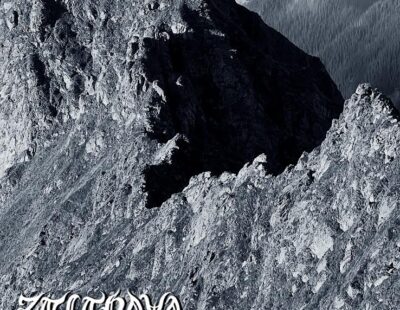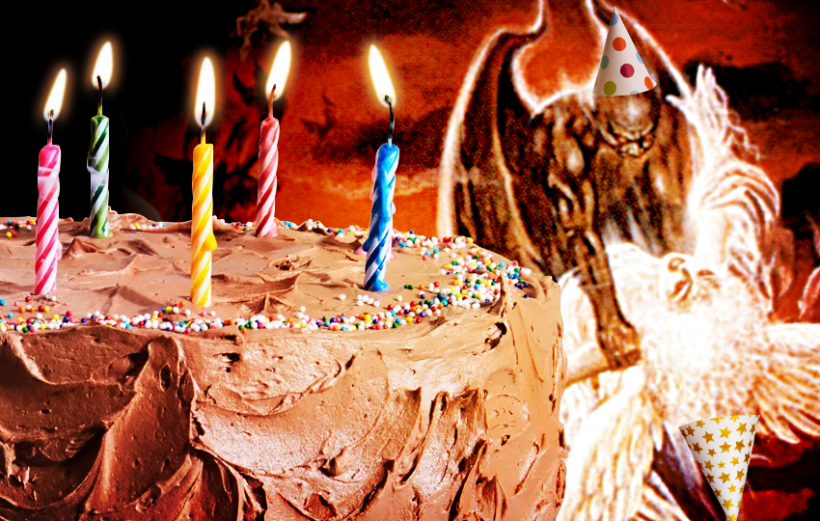
Immolation. King of death metal kings. On this day, 30 years ago, New York’s finest export — not to discount Incantation or Mortician — released their pivotal, soul-crushing debut album, Dawn of Possession, on Roadrunner subsidiary R/C Records. At the time, Immolation were ascendant. Coming off their lauded and much tape-traded second demo, Immolation (1989), and having destroyed Buffalo one October day in 1990 at the A Day of Death fest, where they shared the stage with putrid peers in Cannibal Corpse, Autopsy, Incantation, Disharmonic Orchestra, among others, the young Yonkers-based quartet had the American death metal throne in sight.
Immolation’s hegemony was solidified with their Roadrunner deal. They ignored the advances of A&R luminary Monte Conner (and long-time Decibel bud) initially, but were eventually persuaded (rather, came to their senses) to join the international indie. When Dawn of Possession was released on July 16, 1991, it set off a firestorm in the underground. Officiated with a label deal and unique in their option to choose German production legend Harris Johns (Sodom, Kreator, Voivod) instead of the upswings of the day (Colin Richardson, Scott Burns), Immolation’s first album was (and still is) nothing but artfully savage. From opening track “The Everlasting Fire” and “Immolation” to “Those Left Behind” and the harrowing title track, Dawn of Possession is prime, an example of creativity, uncompromising brutality, and ardent dedication to the craft.
Decibel and Immolation primaries Ross Dolan (bass/vocals) and Bob Vigna (guitars) sat down to go through the Immolation history book to celebrate three decades of Dawn of Possession. Together, we go… into the everlasting fire.
Dawn of Possession turns 30. That must feel unreal now, but it definitely was a different era. Age, mindset, world view, and death metal weren’t congruous. Tell me about the world according to Immolation leading up to Dawn of Possession.
Ross Dolan: It was a completely different world. We started the band in early February 1988. It was really the transition from Rigor Mortis (New York) to this band. Actually, we had the name Rigor Mortis, and at the very beginning we were going to keep it for a hot minute, but because the material was all new and completely different from the Rigor Mortis—in fact, the old singer [Andrew Sakowicz] for Rigor Mortis was going to continue on—we decided to change the name to Immolation. In 1988, we were 19. [Laughs] We were teenagers. We were just starting our journey.
Bob Vigna: Even back then I don’t think 30 years later we’d be looking on our eleventh record. We never thought that way. It’s crazy! [Laughs]
Immolation had a cast of would-be all-stars helping out very early on. Luc Lemay (Gorguts) was responsible for the Immolation demo cover. Mark Mastro (Rottrevore) composed the logo in its final form. And Renato Gallina (Disembowelment) helped out on the original logo concept for Dawn of Possession. This kind of scene-level camaraderie was deeply woven into the early death metal scene.
Ross Dolan: Right. It was a very tight-knit scene from the very beginning. There were fewer bands, there was a lot of excitement for this style of music—it was new, fresh, and different—and tape-trading was a big deal. People actually wrote hand-written letters to one another. It was the only thing we had. Fortunately for us when we released our first demo [‘88 Demo], we got a really good response. We were still green, I think, as far as our introduction into the underground. I had only been introduced to tape-trading only a year or two prior. Not sure if you remember but back then the bigger magazines would have a “Pen Pal” section, a kind of “If you’re interested in…” thing, where some guy would list all these obscure bands, and my first thought was, “Oh, I gotta hear these guys!” [Laughs] I’d send like $5 and get back two 90-minute tapes chocked full of shit. Not only the shit you requested, but a ton of other stuff. It was at that point when we started reaching out to fanzines. We started from the ground up. Our first demo was promoted via underground correspondence, and by that point we were already in regular touch with Autopsy, Sepultura, a lot of bands worldwide. So, that happened very fast. As far as the logo is concerned, it was originally Neal Boback, our original drummer, who did the logo on the first demo. Then, Renato from Disembowelment did another version of that. The final version was done, as you said, by Mark from Rottrevore. We still use that version today. Mark was a good friend. We loved Rottrevore. So, yeah, it was a very tight-knit scene back then. It was a positive vibe. People helped each other out no questions asked, really.
Bob Vigna: Right, Neal did the first logo, but it was the second demo where the logo started to really take shape. I’m not sure why were in touch with Luc [Lemay], but we were talking and next thing we know he’s doing the cover to our demo. That was very cool. Like Ross says, the scene was very small, very close-knit, and there was a very cool vibe to the people involved.
Ross Dolan: We were all in the same boat, I think. Demo bands. We were excited to have friendships with people from across the globe. We were likeminded. We liked the same music. It was cool to discover that. It’s mind-blowing to think that this all existed!
Bob Vigna: Right, our world wide web was tape-trading and letter writing. Do you remember getting that tape of that Italian radio station playing our music? We got a tape from Italy, the DJs are speaking Italian, and we hear the word “Immolation.” Next thing we knew they were playing our first demo. That blew us away! It was real eye-opening for us to suddenly be part of that in a big way. We’d get letters from Poland and Japan, all over really. Everything was through the mail. We’d have all these stacks of fliers for different bands or fanzines, and that’s how we shared information. It was old-school, but it totally worked. Amazing to think that’s how we did all that now.
Ross Dolan: Chris, listen to this. We’d have mail nights. All four of us would get together after a week or two of mail; we had a post office box. So, we’d all get together at Bob’s house after rehearsal, get some pizza, and answer mail. We’d sit around Bob’s big square dining room table and line everything up—fliers, letters, everything! We had a big pile of mail in the middle of table. Each of us would take a piece of mail from the pile and stuff envelopes with hand-written letters, our band’s fliers, other bands’ fliers. Then, the next day we’d take all that mail to the post office. We used to piss off the people at the post office so badly. [Laughs]
Bob Vigna: He’s right! [Laughs] There’d be two people at the post office during our lunch break, and of course like assholes, Ross would take one window and I’d take the other. We’d have like 30 packages each, and back then everything had to be processed individually, weighing everything and so on. It took forever, man. The lines behind us would go out of the post office. [Laughs]
Ross Dolan: They hated us! [Laughs]
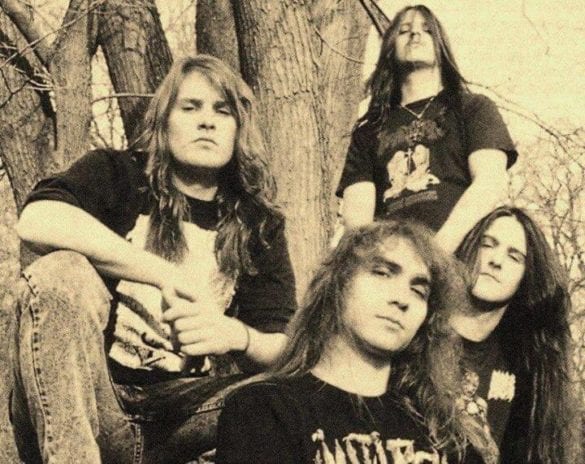
I can totally relate. A good friend of mine—who also works for Decibel—and myself started a ‘zine in 1991. It was called The Requiem. We totally used to piss off the post office clerks. We’d bring in our packages with fucked up customs [CN 22] forms and no tape. The clerks would lose their minds. [Laughs]
Ross Dolan: [Laughs] They’d look at you like they hated you, right? I know that look when you walk in with all that shit. I still have a huge collection of old ‘zines.
Bob Vigna: I think I remember that ‘zine. Very cool you were into all this stuff early on.
Ross Dolan: Do you know the Send Back My Stamps! site? Isn’t that a brilliant idea? So fucking cool. For the younger generation, they’re curious. They want to go back in time to see when the band started. Check out the early stuff. The scene too! The younger fans are hungry for that stuff.
I think the early U.S. ‘zine scene was really strong. I’m talking about Chamber of Sorrow, Exhume, Bloodshed, No Glam Fags, Ultimatum, the Wild Rag, and even Sounds of Death.
Ross Dolan: Oh, Ultimatum?! Kim [August] was our first contact. She was the first American to write us, dude. Right around when we released our 1988 demo. She helped us out in the beginning. Almost managed us in a way. Well, that’s probably pretty loose, but she definitely helped out promoting us and the scene. She put us in contact with Morbid Angel to book their first New York shows. That was in 1988. She facilitated those three shows in 1988. I think Revenant was on those shows, too. She was awesome. Cool as shit. Super into the music. It’s a shame we haven’t stayed in touch. I mean, we haven’t heard from her since like 1991. Do remember Ed Farshtey? He used to run The Book of Armageddon ‘zine.
The name is really familiar but I don’t think we were in direct contact back then. New York was like Mongolia to two young metalheads from cow pasture Michigan.
Ross Dolan: He worked with Roadrunner when we first signed to the label. He was a good friend from the area. Long Island, I think. It was an exciting time, I think. We had access to everything. We had shows, venues, bands, and a lot of people who were really into it. Florida had a good scene. The West Coast had a really strong scene too. Don’t forget Autopsy, Sadus, Exodus, and Dark Angel, two bands before the death metal explosion. We were pretty lucky to be from New York though. We got to see and experience a lot.
How did the deal with Roadrunner (or R/C) happen?
Ross Dolan: [Laughs] Well, Monte Conner, who worked at Roadrunner at the time, wrote a letter to us about signing us. We got that letter. We kind of ignored it. We thought, “Is this for real? They can’t be serious!” So, we put it on the back burner. We just never got back to him. Then, he wrote another letter, which was put in the Stepping on Angels… Before Dawn release, if you remember that. Anyway, that letter said, “Hey guys. This is not the way to go about getting signed.” [Laughs] I remember thinking, “Oh, maybe he’s serious.” It was funny for us. We thought no label like that would sign us. Now that I think about it, it was probably Kim [August] who had sent Monte the [first] demo in the first place. Am I thinking that right, Bob?
Bob Vigna: You’re probably right! I hadn’t thought about that in a really long time. [Laughs]
Ross Dolan: We’re still pretty good friends with Monte. When get together today, we catch up, but we always come back to the early days. The subject of him trying to sign us and us ignoring him still comes up. [Laughs]
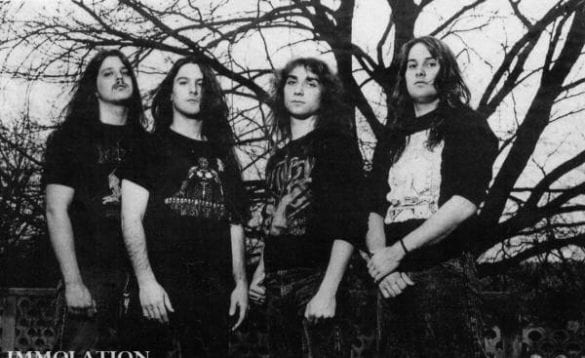
You signed a seven-album deal with Roadrunner, but only produced one for the label. I remember the story, but please do tell it again.
Ross Dolan: Want me to tell that story, Bob?
Bob Vigna: Go right ahead. [Laughs]
Ross Dolan: The contract was a seven-album deal. That was the standard contract. We had hired an attorney who negotiated the contract down to five. Monte will still bring this up in a joking kind of way. What happened was this: we did the first record with Roadrunner, but we were totally green to the music business. We had unrealistic expectations at the time. We were young, on fire, and very hungry. We expected that once we sign to a label, shit’s gonna happen. [Laughs] Immediately after we signed, we realized we’d have to work 10 times harder. Here we thought the hard part was getting signed to a label like Roadrunner. No. The hard work is after. At the time, we were disillusioned by that, and we also felt they weren’t going to promote or put the kind of money into us that we had expected. So, we just thought about getting out of the deal. We set up a meeting with the Roadrunner guys. So, we went down to the New York office on Lafayette Street. This is between Dawn of Possession and us writing the second record. So, we told them, “We’re not happy with you guys. We don’t want to be on the label. We want out of the contract. Otherwise, we’re not going to write any more music.” Laughing, they said, “Is this what you really want?” [Laughs] That was when Roadrunner let go of Immolation. Monte said to us, “You’re the only band in the history of the label to ever request that!” Monte is a good guy, and I think he saw that we were pretty disillusioned. We were just kids, man. We thought they should be doing so much for us. In retrospect, that meeting probably wasn’t our best move. [Laughs]
Bob Vigna: That didn’t make our second album any easier.
Ross Dolan: But we are with Monte again on Nuclear Blast, Bob. So, all these years later we’re still on the same team with Monte, and it couldn’t be any better. We’re really happy to be part of the Nuclear Blast team.
What I really like about an album as extreme and strident as Dawn of Possession is the track sequencing. It’s assembled really well. The flow is brutally good.
Ross Dolan: Sequencing is really important, actually. You’re first person to have brought that up in the million interviews we’ve done. [Laughs] We fucking pull our hair out trying to sequence our records. You want hit ‘em hard out of the gate but at the same time, not lose people halfway through. That’s important. The advance cassette Dawn of Possession actually had a different track order.
Bob Vigna: It did. And I think Monte had a suggestion or two on how the tracks would be ordered. I think it was probably like, “Yeah, this is cool, but you really want the tracks go like this.” Pretty sure we agreed with him all the way on that. He knew about that stuff. He had a lot of experience with these types of things—especially the track-to-track flow—so following his lead on this stuff wasn’t a bad idea.
Ross Dolan: The songwriting for that record was unique only to Dawn of Possession. We had like four years to compose that record. So, like five songs from the demos, plus “Fall in Disease,” which didn’t make it on the 1989 demo. OK, so six songs. The other four songs came to life in the two years after, I think. We were playing “After My Prayers” at the fest in Buffalo. The A Day of Death fest in 1990. I think “After My Prayers” had its debut there.
Bob Vigna: We wrote right up to the last minute though. “The Everlasting Fire” might’ve been the last track written for Dawn of Possession.
Ross Dolan: And “Those Left Behind.” Those were the last two songs we wrote for the record.
Bob Vigna: That’s right. I remember, the first two songs I had were “Immolation” and “Dawn of Possession.” Those go back to 1988.
Ross Dolan: Didn’t you have “Burial Ground” too? Or, at least you were working on it.
Bob Vigna: That’s right. Back then, songwriting was very slow. Songs took like a year to write. [Laughs] That obviously had to change not long after. Now, we’re down to a few months once we get into it.
Where were you coming from lyrically? There’s an intense anti-Catholic vibe.
Ross Dolan: Catholicism, yes. We were familiar with it, but it’s more anti-religion. We used that to turn it around and voice how we felt. We just wanted to use their words to point out the hypocrisy. The entire record wasn’t fully immersed in the anti-religion themes. There are other topics we’re exploring, too. We had our points of view on the subject, and people really related to what we had to say. We didn’t have a Satanic approach either. We weren’t about that. We’d always get asked if we were a Satanic band, but we weren’t. That’s what not what we were or are about today. We were anti-religious for sure. We tried to write our lyrics in an intelligent, artful way, but still to the point. We didn’t want to lead people by the hand, but our message was there and it was strong. There’s a thread of continuity involving religion or anti-religion throughout our records. There’s always something to write about. [Laughs] It surprises me that fucked up shit still happens regarding religion.
Bob Vigna: What we write about today started with that record. We’ve been developing our points of view since then.
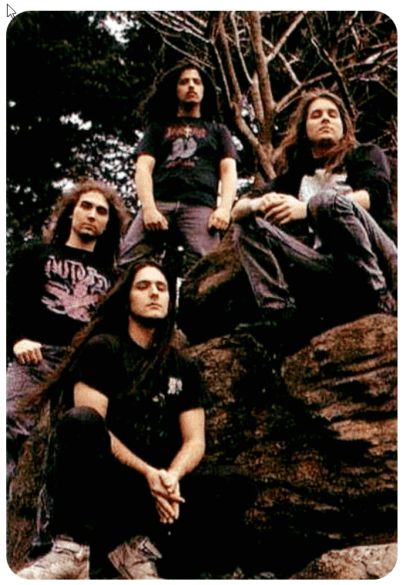
Ross Dolan: You mentioned a lot of prominent bands in the scene then and now. What is good about your point though is that we all had different approaches. Even with lyrics. That what was so refreshing about that time. The bands had their own style, sound, and identity. There’s no way we could do the gore stuff as good as Chris Barnes or Chris Reifert. Glen and Deicide had the Satanic thing on lock down. There was room for everybody back then. But I will say we agonized over the lyrics. There was a lot of trial and error. [Laughs] The lyrics and song titles were a very important process for us. We wanted them composed just as much as we composed our music. They had to work together.
How did Harris Johns come into the picture as a producer?
Ross Dolan: Oh, that’s a crazy story. So, all of a sudden we’re on Roadrunner. We’re pretty happy. They give us a few options. You know the guys, right? Colin Richardson, Harris Johns, and Morrisound Studios. All of the options were great. I mean, Colin Richardson did Symphonies of Sickness, which I think was the first production from him I had heard. Morrisound, obviously, had a track record. We were totally aware of what the Morrisound guys were capable of. But then came Harris Johns. What can I say? It was a no-brainer for us to use Harris and go to Germany. Kreator Pleasure to Kill. Voivod Killing Technology. Sodom. The classics. All these bands that we worshipped had gone to The Music Lab and worked with Harris. In our eyes, he represented the style and sound of the bands we came up with. We got a more organic, rawer, darker sound. That’s what we wanted. That’s why we chose Harris, man. Looking back on it, we’re very glad we did. He’s a class act—an exceptional person. We’re tight with Harris to this very day, actually.
Bob Vigna: We ran into him in 2019. He was a festival doing sound for a band. We were all-too happy to run into him. Every two years or so we run into him.
The album cover by Andreas Marschall (Running Wild, Kreator) is striking. It’s a death metal classic. What do you remember about working with Andreas for that cover?
Bob Vigna: We came up with concept and provided that concept to him. It all started with a rough sketch that was sent to us by fax. We could barely tell what it was—an ink or pencil sketch—but that’s what we had to go by. Back then, unless you had a big budget, the best you could hope for was a fax. That was it. [Laughs] So, we got the fax, we made some suggestions, and the next thing we knew we had the film of the cover FedEx-ed to us. We had to go down to the Roadrunner office to check it out. Monte pretty much said, “Well, here it is. Here you go.” I remember hold it up to the light, thinking, “Wow! This thing is fucking unbelievable.” Andreas had nailed it! It was really well done.
Ross Dolan: Yeah, we were in the Roadrunner office. It was a really bright day. Here we all are pressed against the window. [Laughs] Funny thing is we met Andreas in Germany when we were recording Dawn of Possession. He’s actually really good friends with Harris. Harris just said, “Hey, I’m gonna have a friend stop by. He’s an artist. Maybe you can check out his work?” So, Andreas stops by and I suddenly realize he’s a known movie poster artist. He had done Nekromantik, Dressed to Kill, stuff like that. I mean, I know, ’cause I had the Nekromantik poster. [Laughs] Andreas ended up doing our album art all the way up to Unholy Cult.
Bob Vigna: I think we only asked Andreas to make a few changes. One of the angels had a necklace and a huge bust. More sexual. We didn’t want that to take away from the rest of the image.
Ross Dolan: Right. We didn’t want that angle. We wanted a more classic angel. Biblical not sexual. We wanted to keep it in that realm. More tasteful, I would say. If you want to see the sketch Bob talked about it’s in the booklet for Stepping on Angels… Before Dawn. All the sordid details. [Laughs]

What were the tours like in support of Dawn of Possession?
Bob Vigna: The European tour was our first tour. Devastation, the band from Texas, was supposed to be on the tour, but for some reason they couldn’t make it, so we got asked to join the tour since our record was coming out. We got lucky with that tour. It turned out to be one of the biggest underground metal tours of that year. Phenomenal time, really.
Ross Dolan: We were lucky. The album had just come out. That was one of the biggest tours to go through Europe. That was September 1991. Thirty-nine days, I think. Massacre headlined. Morgoth was support. We didn’t expect the tour to be that big, but it was fucking nuts. Epic, really. After that, we did our first U.S. tour with Goreaphobia. They were a demo band. They didn’t even have an album out! [Laughs] It was just us and Goreaphobia. I booked the tour.
Bob Vigna: We had to do it on our own! Nobody was going to book the tour for us. We wanted to tour, but Monte was like, “Yeah, but why don’t you guys work on the second record?” We weren’t interested in that. We wanted to tour, so we got some contacts and started making calls. We were able to make that happen, right? The record was out. We had a lot of underground interest. That tour turned out pretty good, actually. I think we patted ourselves on the back pretty hard for that one. [Laughs]
Ross Dolan: I remember somebody had given us a routing from another tour that was going around at the time. We had all the venues that would cater to death metal. [Laughs]
Bob Vigna: Yeah, we’d just work the contacts. If somebody didn’t pan out, we’d find another contact. We were relentless. It worked. We booked a pretty good tour considering that we really didn’t know what we were doing.
I think I was at that show at The Marquee in Detroit. The Marquee used to be Todd’s.
Ross Dolan: Yeah, we were there. 1992. August, I think. We used to be in contact with a guy who used to film all the shows there. He was super-skinny with really long hair. I think his name was Ron [Holt]. He used to tape the shows and give us the tapes. I have that show on VHS somewhere. [Laughs]
Dawn of Possession was remastered for the Metal Mind reissue. Listenable just reissued it as well. Do you ever see this record reverting back to you? I know there’s a 35-year clause out there called Length of Ownership.
Ross Dolan: I don’t know about that. Whoever bought out Roadrunner now owns it.
Bob Vigna: The fact that labels are still licensing the record—there’s interest—as of last year, I don’t think there’s a lot of willingness to get rid of it. I’d have to look at the contract we signed, but it’s likely they [Warner Music Group] own Dawn of Possession forever.
Ross Dolan: The publishing is ours. But we don’t own the recordings. As long as there’s interest in licensing, they’ll keep the rights to it. As long as it’s out there, that’s cool by us.
When people talk to you about this album all these years later, what that like for you guys? I mean, we’re doing it for Decibel right now.
Bob Vigna: [Laughs] It’s unbelievable. It’s cool. We appreciate it. We never expected something we did so long ago to continue to resonate with people. Wild, really. We’re always about the next thing, but we have fans who have been with us since this record or even before it so that’s something we’re very lucky to have. This record means a lot to the fans, especially those fans who grew up with it. It’s also cool we have young kids also discovering it now. We couldn’t be more appreciative to have both.
Ross Dolan: It’s kind of cool to talk about those times. I always love talking about and remembering back then. They were fun times. It was an awesome part of our history. I’m glad people want to talk about that time with us. That helps us remember. It’s good to reminisce, from when we started, to the rehearsals, writing the songs, the ups and downs, all the way to meeting Harris.
Bob Vigna: Writing the demos was very cool, but going to another country to record is an experience we’ll never forget it. It’s really special.
Ross Dolan: It’s humbling. I often don’t have a lot of words for all this. Music was our lives. Music helped us survive those years. A reason to continue. When it’s flipped and people approach us, it hits home. We never expected any of this.




